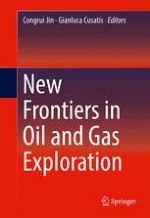2016 | OriginalPaper | Chapter
2. Advancement in Numerical Simulations of Gas Hydrate Dissociation in Porous Media
Authors : Zhen Liu, Xiong Yu
Published in: New Frontiers in Oil and Gas Exploration
Publisher: Springer International Publishing
Activate our intelligent search to find suitable subject content or patents.
Select sections of text to find matching patents with Artificial Intelligence. powered by
Select sections of text to find additional relevant content using AI-assisted search. powered by
